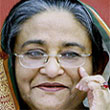
Sheikh Hasina, the former prime minister of Bangladesh returned to power with a landslide victory in the 9th parliamentary poll. With this, the nation now steps into democracy, ending a two-year long extra-constitutional military backed rule. Hasina's Awami League and alliance won over three-quarters of seats in the 300-member parliament.
On Monday’s elections, people came out to vote with full enthusiasm, and as the result shows the Bangladeshis voted for Sheikh Hasina’s call to build a digital Bangladesh. Voters prefer to see the nation an economically developed one, which is the supreme need of a country with over 140 million people.
Bangladesh Awami League (AL) led grand alliance, which consists of 14 parties and the former military autocrat HM Ershad’s Jatio Party (JP), secured the biggest parliamentary majority since 1973, bagging 261 seats out of 299 constituencies, according to an unofficial result.
A total of 299 constituencies went for poll as one of prominent grand alliance candidates died in a fire accident earlier this month; death of this candidate was claimed as a terror act.
The poll day scenario was a festival colour around the country, especially in the capital city Dhaka. It was observed that hundreds of thousands of people came out from residence to the polling centres before 8 am, the starting time for vote on December 29. There was no traffic congestion in the city as large vehicle movements were banned by Election Commission. After casting voting, people were seen to wandering on the street with joy and pleasure.
The mood of festivity was compared with the Bangla New Year, the largest secular festival in Bangladesh. Turnover of vote was more than 70 percent, more than the expectation of EC. Thousands of election officials, agents and foreign and local observers were engaged in their duties in 35-thousand election centres. No such unwanted incidents were reported except some few minor ones, those are insignificant and negligible, as said by the people concerned.
Media of Bangladesh, especially the electronic media made the poll festival more colourful through their live telecast, news from rural Bangladesh, EC media centre and by arranging talk shows on election process, poll result and future actions of the politicians. Shows were furnished by analysts, journalists and political scientists mainly.
At midnight of the poll day, AL president Sheikh Hasina instructed to her party men not to bring out any procession or rally before the official announcement by the Election Commission. This midnight call was applauded by all concerned. BNP had not given any official reaction till the writing was under preparation on midday of December 30. This was also highly praised by all. Analysts mentioned that a party defeated should react properly because future good practice of parliamentary politics depends mainly on them.
Political analysts said that this absolute majority of grand alliance is a sign of rejecting corruption, abuse of power and mandate to the urge of social justice. People rejected the unjust politics and the undemocratic governance system as well, the analysts mentioned.
The presence of huge number voters in poll centres around the country is the symbol of the rejection of undemocratic rule and a signal to the party or alliance that the result of future elections could be reverse, the analyst added.
Political analysts observed that in South Asia absolute majority results bad and it was observed in Pakistan, Bangladesh and India in past. So, AL-led grand alliance should be more attentive to take BNP in a good mood for good governance as this party emerged as a very minority opposition in parliament, they added.
Analysts mentioned the sentence that ABSOLUTE MAJORITY LEAD ABSOLUTE CORRUPTION and cautioned that if grand alliance able to prove the idea, a false Bangladesh might have to face a political catastrophe in near future. Sheikh Hasina is the person who can take initiative for future good governance by taking opposition in good mood, the analysts farther added.
They also suggested that BNP should not be measured only on the basis of the number of seats. In number game, BNP is a very minor opposition in parliament but in terms of the vote, the party acquired, BNP is not the party to be dishonoured.
For BNP, Analysts suggested that BNP Chairperson Khaleda Zia is the leader who has the scope to show the highest level of honour to the democratic system. She made BNP a real political force and led the party in state power for two times from 1991 to 1996 and then again from 2001 to 2006. Analysts said Khaleda Zia should resign from the day to day leadership of BNP but not from the politics. This could be an example of democratic norms in Bangladesh and should go for reorganizing her party by analyzing the mistakes done. And of course BNP should work like an opposition with democratic norms in parliament with all limitations.
Political analysts concluded that both AL and BNP should have honour to people’s verdict that could lead the nation to a better democracy, otherwise people might be started thinking in different way as thinking pattern of mass has already been changed.
|
|


Comments: